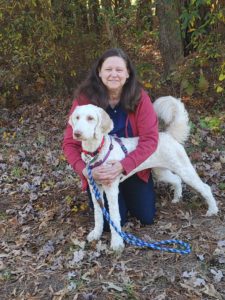Certified service dog coach Elaine Chevalier, CPDT-KA, teaches people with disabilities to train their own dogs for service work through her business, Able Dog in Wake Forest, North Carolina. She also offers puppy training and family dog training. Elaine volunteers her time for a nonprofit, Vets to Vets United, which places shelter dogs with veterans.
What made you decide you wanted to train service dogs?
My family adopted a retired guide dog in 1973, and I became fascinated with how dogs can help people. I grew up in and around military towns, Virginia Beach and Norfolk, Virginia, so I had a strong connection to the military.
Additionally, I grew up in the era of the Vietnam War and was greatly affected by it. My husband’s father is a disabled Vietnam veteran. Many Vietnam vets have only been getting the help they need in the last 15 years or so. There are many Vietnam vets who still need help, and there will always be an ongoing need for veteran service dogs. Tragically, many veterans are dying by suicide daily. If I can help in some way I would like to. I am deeply thankful to our veterans. They did for our country what I cannot do, so I am doing what I can for them.
Tell us about your work training service dogs.
Primarily, I train psychiatric service dogs. I have taken extra courses through Cooperative Paws to have the skills to teach psychiatric service dog tasks, and it is what I am most qualified to teach.
I am planning on taking Cooperative Paws’ mobility service dog tasks course. Veterans often need both psychiatric and mobility tasks, and I am getting a Labrador Retriever puppy next year to serve as my own service dog. This course will be a huge benefit as we begin our training together, as well as to my clients.
Tell us about your dog training business.
I have been offering dog training through my business, Able Dog, for 16 years. I took a foundation program in general dog training in 2005, and I have educated myself with every video, seminar and book I can find. I took many seminars on puppy development and specialized in clicker training and puppy training. I love working with the entire family so all are interacting with the dog in a happy and consistent manner.
Has offering service dog training had an impact on your business?
Offering service dog training has increased my income over time. I also have clients who continue to work with me over a longer period of time. By specializing in service dog training, I have a niche that sets me apart from other trainers. Additionally, it gives more meaning to my work.
What did you like most about the SDC program?
I especially appreciated the thoroughness and ethics of the program. The SDC course covered more than task training. I learned about the laws of service dog training, and the program includes business paperwork and forms that are needed to provide comprehensive services to clients.
What has surprised you about working with service dogs?
I’ve been surprised by the need for education for both the general public and clients as to the difference between a service dog, a therapy dog and an emotional support dog. Also, I’ve been surprised by how hard it is to find adult service dog candidates.
What advice would you give to trainers thinking about getting involved in service dog training?
Patience and people skills are essential. There is a greater responsibility in training service dogs than in working with basic training clients.
You will need to commit to a long training process with clients. Service dog training often takes two years, and clients need ongoing support after their dog is trained. Consider whether you are ready to handle the ups and downs of this long training process with clients.

